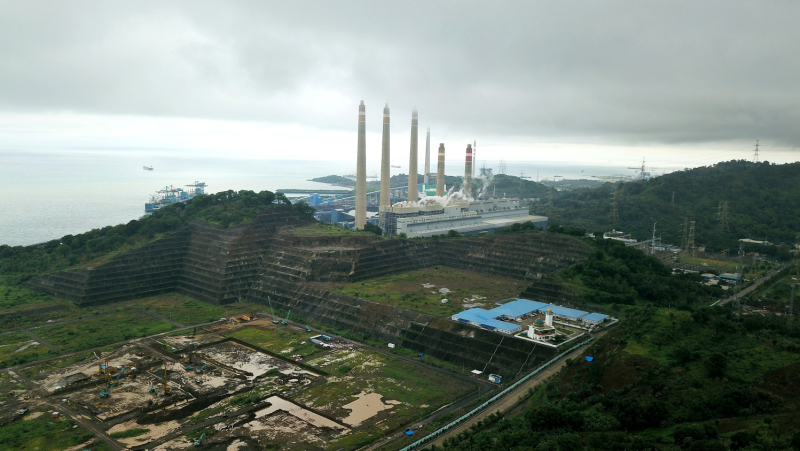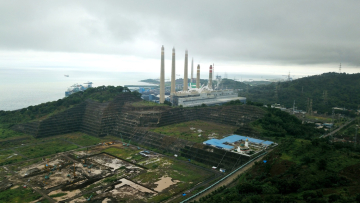
Project – On record
This profile is no longer actively maintained, with the information now possibly out of dateBankTrack & Trend Asia

Project – On record
This profile is no longer actively maintained, with the information now possibly out of dateBankTrack & Trend Asia
Why this profile?
The Java 9 & 10 projects poses a major threat to the human rights and health of the people of Java, Indonesia, including widespread pollution, thousands of premature deaths and a large child morbidity burden. The project also would drastically increase Indonesia’s greenhouse gas emissions.
What must happen
The expansion of coal power plants is not compatible with the goals of the Paris Climate Agreement, and banks must therefore stop financing new coal power plant developments. As such, banks should steer clear of financing this project directly or indirectly.
| Sectors | Coal Electric Power Generation , Coal Mining |
| Location |
|
| Status |
Planning
Design
Agreement
Construction
Operation
Closure
Decommission
|
| Website | https://www.irt.co.id/ |
Java 9 & 10 is a planned expansion project of the existing Suralaya coal-fired power plant, located in Banten, Indonesia. About 80% of the construction of the project has been completed to date (September 2023), and is planned to be fully operational in 2025. The two-unit expansion has attracted over US$ 3.9 billion, will have a 2GW capacity, and presents major climate and public health risks.
Impact on human rights and communities
Impact on human health It is estimated that the increase in air pollution caused by the Java 9 & 10 plant will cause approximately 4,700 deaths over its lifetime. These deaths will mostly be caused by particulate matter which leads to respiratory and cardiovascular diseases and cancer, especially in vulnerable groups. The operation of the existing plants in Java has already caused more than 100,000 cases of acute respiratory diseases in Cilegon city, and the addition of the Java 9 & 10 power plants will only increase this impact.
Impact on livelihoods Since the establishment of the first Suralaya coal power plant in 1984, reports have surfaced of the power plant’s waste and disturbance heavily impacting the fish population in the coastal waters of north Banten. The Banten province is known for its beach attractions and a large number of residents in the area depend on the tourist beaches for their livelihood. Pulorida Beach no longer exists because of the expanding energy sector, and Kelapah Tujuh Beach has now been closed off for the construction of Java 9 & 10, forcing nearby businesses to close down.
Impact on climate
Emissions and contribution to climate change Java 9 & 10 will generate emissions of over 250 million tonnes of CO2 during its lifetime, resulting in huge climate impacts. Furthermore, the economic, energy and development argument for Jawa 9 & 10 is weak. The Java-Bali grid where the project is located already has the highest level of electrification in the country (around 99%) and over 40% of the electricity produced in the region is excess. 57.2% of the country's power requirements are met by coal. This expansion project will only mean that more coal will be used, thereby leading to increased levels of emissions and pollution.
Air pollution The Banten Province has become an epicentre of air pollution due to the presence of numerous coal fired power plants releasing nitrogen dioxide, sulphur dioxide, mercury, lead, arsenic, cadmium and particulate matter. Java 9 & 10 will contribute significantly to this. The new plants would require 9,572,000 tons of coal per year, further increasing the air pollution in the area.
During the construction phase of the project, there are several activities that will degrade the air quality in the region. These include demolition of existing infrastructure, excavations and construction of new facilities. Other related activities such as shipping of resources, use of diesel-powered transport and equipment, and auxiliary boilers will also result in the emission of particulate matter, nitrogen oxides and sulphur dioxide.
Java 9 & 10 also poses threats to local soil structure and groundwater that come with any large construction project entailing heavy vehicles, soil compaction, and wastewater discharge.
Other impacts
The project was financed through a US$ 2.6 bn debt facility which was closed in November 2020, as well as an equity bridge facility in October 2020. DBS was the financial advisor and participating lenders include Korea Export Import Bank, Korea Development Bank, Hana Bank of South Korea, CIMB and Maybank of Malaysia, Bank of China, Bank Mandiri, Bank Negara Indonesia and Exim Bank of Indonesia. To secure its equity in the project, PT Barito Pacific has also secured a $252.7m USD corporate loan with Bangkok Bank.
More recently, KEPCO announced in May 2022 that it will sell off all of its coal assets outside of Korea, after the energy crisis in 2022 and frozen electricity prices in Korea inflicted heavy losses on the company. It is still unclear when and how this will be implemented in relation to the utility’s equity stake in Java 9 & 10.
Finally, of note is that the International Finance Corporation (IFC) has been indirectly involved in Jawa 9 & 10 from its inception. The IFC has given significant financing to Hana Bank Indonesia, a subsidiary of parent Hana Bank Korea. This includes a US$ 5 million equity investment in December 2007, a US$ 15 million short-term loan in July 2010, a US$ 30 million loan in February 2014 and a US$ 15 million equity investment in May 2019. As well as this debt financing, IFC ultimately owns a 10% stake in Hana Bank Indonesia, which, in turn, is known to heavily finance the Jawa 9 & 10 expansion. Though indirect, this link between the IFC and a major coal power plant in Indonesia presents a major failing in the IFC’s Green Equity Approach (GEA), which encourages its financial intermediary clients (e.g. commercial banks) to reduce coal investments. Hana Bank was the IFC’s first GEA client.
The entire Suralaya coal-powered complex, of which the new Jawa 9 & 10 units are part, is owned by Perusahaan Listrik Negara (PT PLN). Indo Raya Tenaga (IRT) is the Jawa 9 & 10 project’s special purpose vehicle and is owned by PLN (51%), Barito Pacific (34%), an Indonesian energy company, and Korea’s largest electric utility, KEPCO (15%).
Project sponsor
Other companies
2024
2024-07-11 00:00:00 | Ombudsman to investigate World Bank's ties to Java 9 & 10 project
The internal inquiry will address allegations that the World Bank Group’s private lending arm, the International Finance Corporation (IFC), is contributing to immense harm through its back door support for the expansion of Southeast Asia’s largest and dirtiest coal-fired power station.
2023
2023-09-25 00:00:00 | Report reveals over 1500 deaths a year and up to $1bn in costs of Suralaya complex
A report released by the Centre for Research on Energy and Clean Air (CREA) has revealed the massive health and economic burden of the Suralaya coal complex, of which proposed units Java 9 & 10 are a part. The research centre estimates that about 1500 deaths a year are attributable to the coal-fired power complex, in a month when Jakarta has the worst air pollution on the planet. The paper also describes the economic burden of the coal industry in Suralaya. Through the impacts on work absence, prenatal and neonatal illnesses, long-term disability and respiratory illness-related hospital visits, the authors estimate an economic cost of the coal industry approximating USD $1bn. They also debunk Indonesian government rhetoric downplaying the impact of the coal industry on Jakarta's air pollution.
2023-09-14 00:00:00 | Civil society lodges formal complaint against the IFC for its indirect support of Java 9 & 10
A formal complaint was lodged in September 2023 by our partners Trend Asia, PENA Masyarakat, Inclusive Development International (IDI) and Recourse against the World Bank's private sector lending arm, the International Finance Corporation (IFC), for its involvement in Java 9 & 10. The complaint was motivated by local communities' staunch opposition to the proposed coal plant units. Communities say the plants are unnecessary and that the impacts will be catastrophic for local people and the climate. Thousands of premature deaths and more than 250 million metric tons of CO2 are estimated to result from the coal-fired power plant. The IFC is indirectly involved in the coal plants, which are currently under construction, through Hana Bank Indonesia, a financial intermediary. The IFC's intermediaries are banks that have been financed by the IFC through debt and equity investments and which then go on to provide finance to projects and companies. Recourse says that the World Bank's IFC has since closed loopholes in its policies that allowed the indirect financing of Java 9 & 10 through Hana Bank, but that the IFC still has a long way to go to ensure that its clients do not use IFC funds (originally, taxpayers' contributions via member states of the World Bank) to finance climate-damaging projects around the world.
2023-03-30 00:00:00 | Brief history
The Banten Suralaya Power Station is a coal fired power plant owned by Perusahaan Listrik Negara (PLN) in the Indonesian island of Jawa, consisting of eight power generating units. The facility receives coal from the Suralaya Coal Terminal, which is provided by Bukit Asam Coal Mining operations in Sumatra. In 2016, plans for an expansion of the plant were released by PT PLN, in the form of two new power generating units.
Construction of units 9 & 10 was supposed to commence in December 2017 but was delayed. In September 2018, it was reported that Dosan Heavy Industries and Construction along with Indo Raya Tenaga would begin the construction of units 9 & 10 in early 2019. In June 2020, KEPCO invested $51m USD to secure a 15% stake in the Jawa 9 & 10 project from Barito Pacific.
In 2019, PT PLN released a long-term plan, in which it stated that construction would start in the beginning of 2020. It lists 2023 and 2024 as the completion deadlines for Jawa 9 and 10 respectively. Construction was further delayed as the project only achieved financial close in late 2020.
In August 2020, WALHI filed a lawsuit to compel the governor of Banten Province to revoke the environmental permit for the expansion issued in 2017, which was based on the project’s Environmental Impact Assessment (EIA). WALHI argued that the public consultation as part of the EIA was inadequate and that the impact assessment of decreased air quality and public health problems of Jawa 9 & 10 was based on incomplete, outdated and invalid information. The lawsuit was withdrawn in February 2021 because a new environmental permit was issued in 2018 that WALHI was unable to access. Public access to Jawa 9 and 10’s environmental permit has been very limited and until the filing of the lawsuit, there was little transparency around the project’s environmental and social due diligence. Only during the court case, WALHI was made aware that there was an updated environmental permit.



